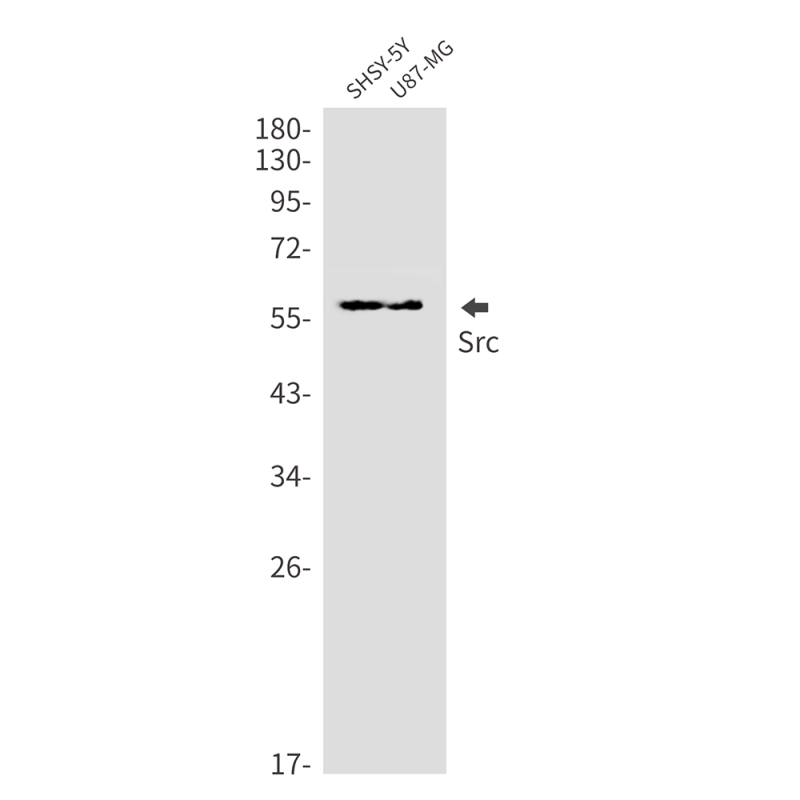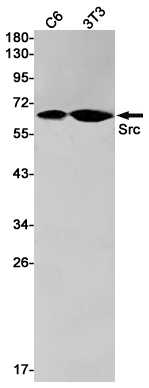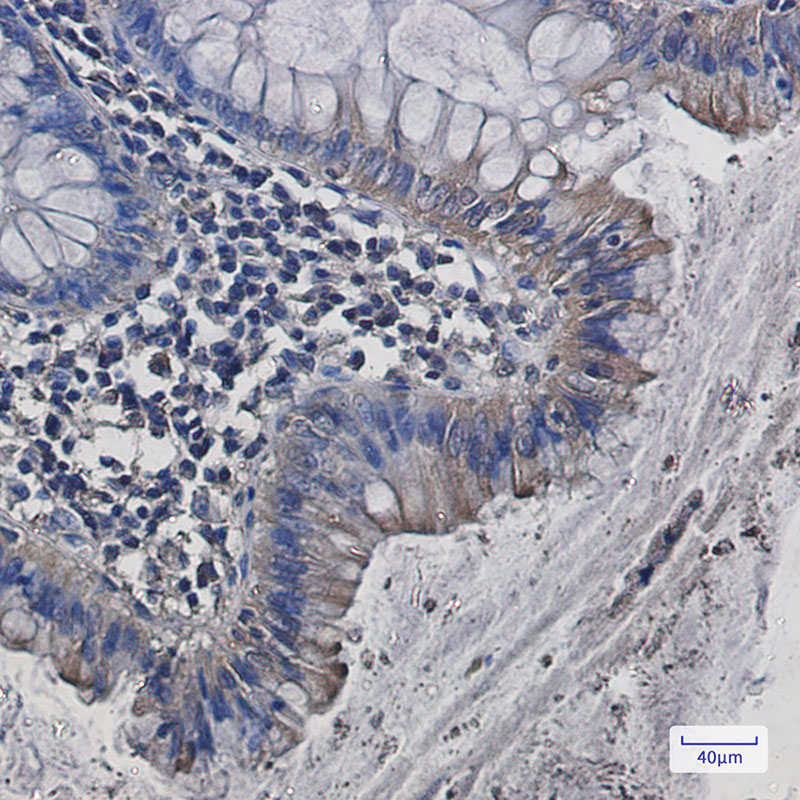


| WB | 1/500-1/1000 | Human,Mouse,Rat |
| IF | 咨询技术 | Human,Mouse,Rat |
| IHC | 1/50-1/100 | Human,Mouse,Rat |
| ICC | 技术咨询 | Human,Mouse,Rat |
| FCM | 咨询技术 | Human,Mouse,Rat |
| Elisa | 咨询技术 | Human,Mouse,Rat |
| Aliases | SRC; SRC1; Proto-oncogene tyrosine-protein kinase Src; Proto-oncogene c-Src; pp60c-src; p60-Src |
| Entrez GeneID | 6714 |
| WB Predicted band size | Calculated MW: 60 kDa; Observed MW: 60 kDa |
| Host/Isotype | Rabbit IgG |
| Antibody Type | Primary antibody |
| Storage | Store at 4°C short term. Aliquot and store at -20°C long term. Avoid freeze/thaw cycles. |
| Species Reactivity | Human,Mouse,Rat |
| Immunogen | A synthetic peptide of human Src |
| Formulation | Purified antibody in TBS with 0.05% sodium azide,0.05%BSA and 50% glycerol. |
+ +
以下是关于Src抗体的3篇参考文献,涵盖其应用与开发的关键研究:
---
1. **文献名称**: *Structural basis for activation of human Src kinase through SH2 domain phosphorylation*
**作者**: Yamaguchi, H., & Hendrickson, W. A.
**摘要**: 该研究解析了Src激酶活性调控的结构机制,利用特异性Src抗体检测磷酸化状态,揭示了SH2结构域磷酸化如何激活激酶活性,为靶向治疗提供理论依据。
2. **文献名称**: *Development and application of phospho-specific antibodies to investigate Src kinase signaling in cancer*
**作者**: Summy, J. M., et al.
**摘要**: 研究团队开发了针对Src激酶Tyr416位点磷酸化的特异性抗体,验证其在乳腺癌和结肠癌细胞中的检测效果,证明其在高活性Src肿瘤诊断中的潜在应用价值。
3. **文献名称**: *Regulation of neuronal morphogenesis by Src kinase signaling pathways*
**作者**: Sfakianos, M. K., et al.
**摘要**: 通过Src抗体进行免疫沉淀和Western blot分析,揭示Src在神经元突触形成中的作用,发现其通过Rho GTPase通路调控树突发育,为神经发育障碍研究提供新方向。
---
**说明**:以上文献选择聚焦于Src抗体的开发(如Summy的磷酸化抗体)及其在结构生物学(Yamaguchi)和疾病机制(Sfakianos)中的应用,涵盖癌症与神经科学领域,体现工具抗体在不同研究场景中的实用性。
Src antibodies are essential tools in cancer research and molecular biology, primarily targeting the Src family kinases (SFKs), a group of non-receptor tyrosine kinases. Discovered as the first proto-oncogene, c-Src plays a pivotal role in regulating cellular processes such as proliferation, differentiation, adhesion, and migration. Dysregulation of Src activity, often due to mutations or overexpression, is linked to tumor progression, metastasis, and drug resistance in cancers like colon, breast, and pancreatic malignancies.
Src antibodies are designed to detect specific isoforms (e.g., c-Src, Lyn, Fyn) or post-translational modifications (e.g., phosphorylation at Tyr416. a marker of activation). They enable researchers to assess Src expression levels, activation status, and subcellular localization via techniques like Western blotting, immunohistochemistry, and immunofluorescence. Monoclonal antibodies offer high specificity for targeted epitopes, while polyclonal antibodies provide broader detection across conserved SFK domains.
Clinically, these antibodies aid in biomarker studies, helping correlate Src activity with disease prognosis or therapeutic response. They also support drug development by validating Src inhibitors (e.g., dasatinib) in preclinical models. However, cross-reactivity with other SFKs requires careful validation to ensure data accuracy. Overall, Src antibodies remain indispensable for unraveling Src-related signaling pathways and advancing targeted cancer therapies.
×